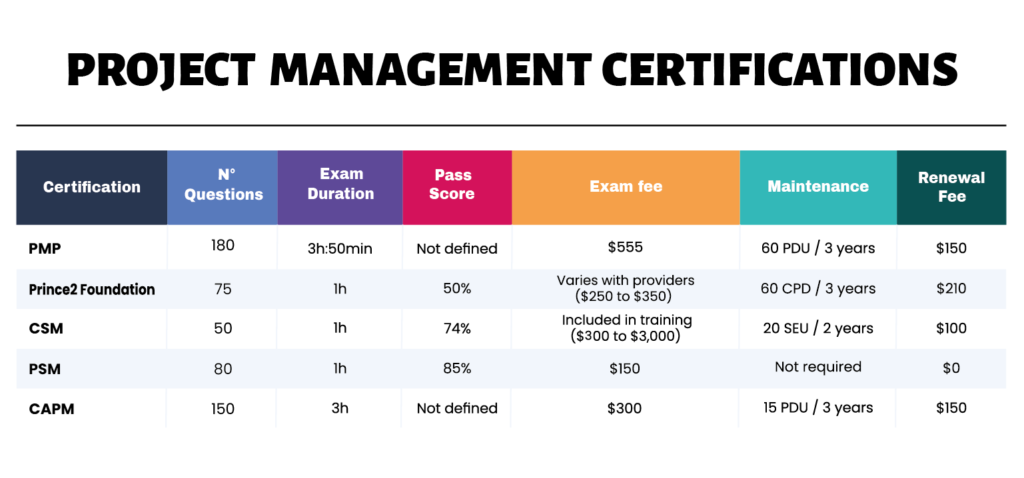Whether you are a veteran or a newbie trying to climb up the ladder, the adequate project management certificate can accelerate your professional evolution by honing your tactical and leadership skills and increasing your visibility to senior staff.
Robert Half’s Technology & IT 2021 Salary Guide lists project management as a hot certification, with salaries varying by country and level of expertise. It cites a salary range of $92,000 for candidates with little or no prior expertise in the position to $161,500 for project managers with strong skills, expertise, and more importantly specialized certifications. This explains why project management certifications have appeared in every list of popular, targeted, or most desirable certifications since the early 2000s.
If you are interested in becoming a project manager or just want to add project management to your list of soft skills, a project management certification can be a great career move. To give you an idea of which project management credentials employers look for in prospective candidates, we chose for you these five leading certifications that will help you increase your value.
Choosing a proven and trusted resource for your project management certification is a crucial step toward getting the credential you’re aiming for. One of the most common certification providers is the Project Management Institute (PMI). It offers several certification options to aspiring project managers. These certifications cover all career levels, from entry-level fundamentals to advanced experience and specialized areas.

Project Management Professional (PMP)
PMI calls its internationally recognized certification “the gold standard of project management.” The Project Management Institute does not endorse specific review courses, resources, references, or any other materials for the PMP certification preparation. However, they do reference a list of ten resources including their Project Management Body of Knowledge (PMBOK) and the Agile practice guide.
There are two ways to qualify for the PMP, both of which require 35 hours of education (aka contact hours): The first way includes a four-year degree, a minimum of 4,500 hours of work experience (about two and a half years in a full-time job), plus the required contact hours. The second way includes a secondary degree, 7,500 hours of experience (about four years in a full-time job), and the required contact hours.
The PMP certification exam focuses on three main domains: People, Process, and Business environment. Predictive, agile, and hybrid approaches are included across the three exam domains. The exam consists of 180 questions with a duration of 230 minutes. Questions are a combination of multiple-choice, multiple responses, matching, hotspot, and limited fill-in-the-blank.
A PMP certificate requires renewal every three years through completing 60 Professional Development Units (PDUs). There are many ways to earn PDUs, including in-person and online courses, giving presentations related to your certification, and even volunteering your services to certain organizations.
A PMP certification signifies your capability to speak the global language of project management and indicates that you can work as a project manager in virtually any industry following any methodology in any location.
PRojects IN Controlled Environments (Prince2)
The PRINCE2 certification is a process-based project management method that offers a systematic approach to delivering a successful project with clear templates, processes, and steps. PRINCE2 is administered in the UK by the APMG.
PRINCE2 is both project and process-focused: it is a broad, high-level, general framework of project management principles, it spells out the roles and responsibilities of each member of the team tasked with managing the project. It also divides the master project plan into project plans, stage plans, and team plans, in order to eliminate ambiguity and make project execution easier.
PRINCE2 training is delivered by AXELOS’ global network of Accredited Training Organizations (ATOs). There are two levels of certification in Prince2: Prince2 Foundation and Prince2 Practitioner. The certification requirements vary for both. For instance, there are no specific pre-conditions for Foundation level certification. However, it is preferred to have a basic knowledge of managing projects but it is not mandatory. The prerequisites for the Prince2 Practitioner Level Certification exam are proof of passing one of the following: Prince2 Foundation, PMP, CAPM, or IPMA Level A/B/C/D.
The Prince2 Foundation certification exam duration is 1 hour, including 75 questions, with a required 50% pass percentage (you need to get at least 35 questions correct out of the total 70 questions, while 5 questions are trial questions not counted in your score). The exam reference book is Managing Successful Projects with PRINCE2 publication, 2017 edition. Questions include the regular classic questions with 4 answer options, filling in a missing word type, or picking 2 correct statements from a given list of 4 statements. The Prince2 Practitioner exam is an open-book exam with a duration of 2.5 hours involving objective testing. The exam includes 68 questions with a 55% pass score, meaning you need to get 38 marks at least out of 80 available.
Prince2 Practitioner certificate is valid for 3 years. After this term, you can retake the exam to continue your credentials or you have the option to renew it through an Axelos Membership. Moreover, you need to earn and report 20 CPD (Continuing Professional Development) points every year for the 3-year period to maintain your certificate. There are four categories for earning Prince2 CPD points: Professional experience, Training, Community Participation, and Self-Study.
Certified Scrum Master (CSM)
The CSM certification official provider is the Scrum Alliance. The CSM certification gives a comprehensive overview of the Scrum framework for agile project management i.e., the basics of the Scrum lifecycle, how to organize a Scrum team and set up the project, how to manage releases and sprints, etc.
To undertake the CSM exam, you must first take an in-person two-day (16 hours) or live online (14 hours) Certified Scrum Master course with one of a Certified Scrum Trainer (CST). Course attendance is required to earn the CSM certification and gain access to the online CSM test. The CSM test contains 50 multiple-choice questions based on the CSM Learning Objectives, and candidates will have one hour to complete them. The passing score is 74%. Students are given two free attempts to pass the test.
The CSM certification is valid for 2 years. To maintain the certification beyond, it’s required to complete 20 Scrum Education Units (SEUs), along with a renewal fee. Common ways to earn SEUs include attending relevant events, taking a Scrum Alliance course offered by a Certified Scrum Trainer, volunteering and sharing your experience, and learning independently by watching presentations or reading blogs and books.
Professional Scrum Master (PSM)
Scrum.org is the official provider of the Professional Scrum Master certification. The PSM comes in three levels: level I demonstrates the fundamentals of Scrum mastery, level II improves knowledge of real-world complicated problems, and level III helps handle complex teams and organizations.
Taking a course is not required. If you already possess a high level of Scrum knowledge, as well as an understanding of the Scrum Guide and how to apply Scrum within Scrum Teams, you can take the PSM I assessment directly. If not, there are plenty of online courses to help you prepare for the assessment and gain a better grasp of Scrum.
The PSM1 exam is taken online with a 60-minute duration to attempt a total of 80 questions. You must answer at least 68 questions correctly to pass. Once you get the PSM credential, there is no need for renewal as it has lifetime validity.
Certified Associate in Project Management (CAPM)
The Certified Associate in Project Management certification is provided by the Project Management Institute (PMI). The CAPM designation demonstrates an understanding of the fundamental processes, terminology, and knowledge of project management. This degree can act as a stepping stone for beginners to get certified as a Project Management Professional (PMP).
The main difference between the PMP and CAPM certificates is that it’s possible to get a CAPM without any project management experience, while PMP requires at least 4,500 hours of experience. You can qualify for the CAPM certificate if you have a secondary degree (high school diploma, associate’s degree, or the global equivalent) and you complete 23 hours of project management education by the time you sit for the exam.
All current and future CAPM certification holders will no longer have to retake the three-hour exam every five years to retain the certification. Moving forward, certification holders will have to earn 15 professional development units (PDUs) over three years and pay a renewal fee.
The 15 PDUs can be further broken down as follows: Minimum of 9 Education PDUs and Maximum of 6 Giving Back PDUs. Education PDUs for all 15 required PDUs can meet the requirement, however a minimum of 2 PDUs for each Education-related skill: Technical, Leadership, and Business are needed then you can complete electives to earn the remainder of their Education PDUs. CAPM holders who want to pursue Giving Back PDUs can earn a maximum of 2 PDUs for working as a professional (not required), and up to 6 PDUs for volunteering or creating content.
Someone with minimal experience might decide to pursue the CAPM certification first, then work as a project manager until they qualify for the PMP certification. However, someone who already has years of project management experience under their belt might decide to go straight for the PMP.
Finally, we should emphasize that the certification you choose should depend on your job prospects and the region you are working in. For instance, if you need a certificate to prove that you’ve got some training, we recommend you go for CAPM. On the other hand, if you actually need a practical application of how to execute your job as a project manager, you should go for the PRINCE2 or the PMP certification programs.
Before making a choice, you should thoroughly review the prerequisites to determine which certificate is best for you. If you still can’t decide which program will fit your career course, we recommend you do your research before choosing: thoroughly go through the displayed information about each certificate, and in case you know any certified or experienced PMs, you can ask them for advice regarding their own experiences and their recommendations.
